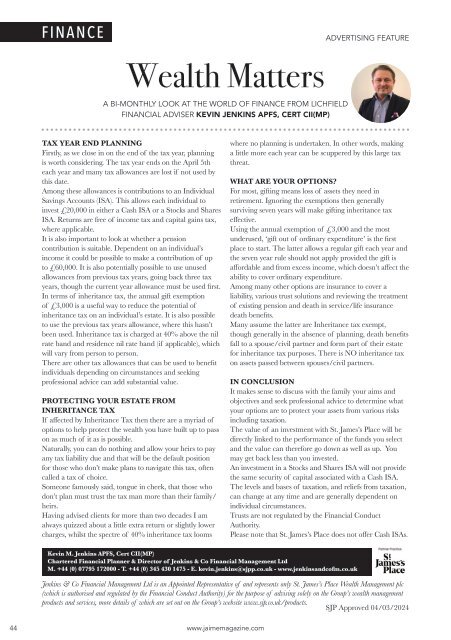J’AIME MARCH/APRIL 2024
You local luxury lifestyle magazine
You local luxury lifestyle magazine
Create successful ePaper yourself
Turn your PDF publications into a flip-book with our unique Google optimized e-Paper software.
FINANCE<br />
ADVERTISING FEATURE<br />
Wealth Matters<br />
A BI-MONTHLY LOOK AT THE WORLD OF FINANCE FROM LICHFIELD<br />
FINANCIAL ADVISER KEVIN JENKINS APFS, CERT CII(MP)<br />
TAX YEAR END PLANNING<br />
Firstly, as we close in on the end of the tax year, planning<br />
is worth considering. The tax year ends on the April 5th<br />
each year and many tax allowances are lost if not used by<br />
this date.<br />
Among these allowances is contributions to an Individual<br />
Savings Accounts (ISA). This allows each individual to<br />
invest £20,000 in either a Cash ISA or a Stocks and Shares<br />
ISA. Returns are free of income tax and capital gains tax,<br />
where applicable.<br />
It is also important to look at whether a pension<br />
contribution is suitable. Dependent on an individual’s<br />
income it could be possible to make a contribution of up<br />
to £60,000. It is also potentially possible to use unused<br />
allowances from previous tax years, going back three tax<br />
years, though the current year allowance must be used first.<br />
In terms of inheritance tax, the annual gift exemption<br />
of £3,000 is a useful way to reduce the potential of<br />
inheritance tax on an individual’s estate. It is also possible<br />
to use the previous tax years allowance, where this hasn’t<br />
been used. Inheritance tax is charged at 40% above the nil<br />
rate band and residence nil rate band (if applicable), which<br />
will vary from person to person.<br />
There are other tax allowances that can be used to benefit<br />
individuals depending on circumstances and seeking<br />
professional advice can add substantial value.<br />
PROTECTING YOUR ESTATE FROM<br />
INHERITANCE TAX<br />
If affected by Inheritance Tax then there are a myriad of<br />
options to help protect the wealth you have built up to pass<br />
on as much of it as is possible.<br />
Naturally, you can do nothing and allow your heirs to pay<br />
any tax liability due and that will be the default position<br />
for those who don’t make plans to navigate this tax, often<br />
called a tax of choice.<br />
Someone famously said, tongue in cheek, that those who<br />
don’t plan must trust the tax man more than their family/<br />
heirs.<br />
Having advised clients for more than two decades I am<br />
always quizzed about a little extra return or slightly lower<br />
charges, whilst the spectre of 40% inheritance tax looms<br />
where no planning is undertaken. In other words, making<br />
a little more each year can be scuppered by this large tax<br />
threat.<br />
WHAT ARE YOUR OPTIONS?<br />
For most, gifting means loss of assets they need in<br />
retirement. Ignoring the exemptions then generally<br />
surviving seven years will make gifting inheritance tax<br />
effective.<br />
Using the annual exemption of £3,000 and the most<br />
underused, ‘gift out of ordinary expenditure’ is the first<br />
place to start. The latter allows a regular gift each year and<br />
the seven year rule should not apply provided the gift is<br />
affordable and from excess income, which doesn’t affect the<br />
ability to cover ordinary expenditure.<br />
Among many other options are insurance to cover a<br />
liability, various trust solutions and reviewing the treatment<br />
of existing pension and death in service/life insurance<br />
death benefits.<br />
Many assume the latter are Inheritance tax exempt,<br />
though generally in the absence of planning, death benefits<br />
fall to a spouse/civil partner and form part of their estate<br />
for inheritance tax purposes. There is NO inheritance tax<br />
on assets passed between spouses/civil partners.<br />
IN CONCLUSION<br />
It makes sense to discuss with the family your aims and<br />
objectives and seek professional advice to determine what<br />
your options are to protect your assets from various risks<br />
including taxation.<br />
The value of an investment with St. James’s Place will be<br />
directly linked to the performance of the funds you select<br />
and the value can therefore go down as well as up. You<br />
may get back less than you invested.<br />
An investment in a Stocks and Shares ISA will not provide<br />
the same security of capital associated with a Cash ISA.<br />
The levels and bases of taxation, and reliefs from taxation,<br />
can change at any time and are generally dependent on<br />
individual circumstances.<br />
Trusts are not regulated by the Financial Conduct<br />
Authority.<br />
Please note that St. James’s Place does not offer Cash ISAs.<br />
Kevin M. Jenkins APFS, Cert CII(MP)<br />
Chartered Financial Planner & Director of Jenkins & Co Financial Management Ltd<br />
M. +44 (0) 07795 172000 - T. +44 (0) 345 430 1475 - E. kevin.jenkins@sjpp.co.uk - www.jenkinsandcofm.co.uk<br />
Jenkins & Co Financial Management Ltd is an Appointed Representative of and represents only St. James’s Place Wealth Management plc<br />
(which is authorised and regulated by the Financial Conduct Authority) for the purpose of advising solely on the Group’s wealth management<br />
products and services, more details of which are set out on the Group’s website www.sjp.co.uk/products.<br />
SJP Approved 04/03/<strong>2024</strong><br />
44 www.jaimemagazine.com
















